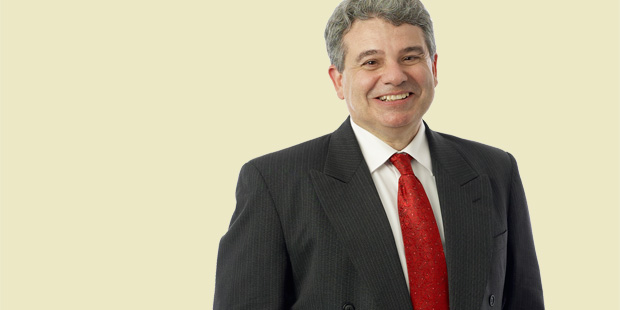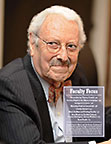Introducing José Alvarez
Herbert and Rose Rubin Professor of International Law
Printer Friendly VersionInternational law scholar José Alvarez is known to ruffle feathers. Giving a keynote speech that became “Torturing the Law” in the Case Western Reserve Journal of International Law (2006), he was one of the first academics to suggest that the Bush administration probably violated the lawyers’ code of professional responsibility post-9/11. Delivering his lecture “The Schizophrenias of R2P” at The Hague in 2007, he questioned whether the sacred cow of many NGOs—the so-called “responsibility to protect” principle—could be misused to violate the rights of states and their peoples.
Yet he still took his colleagues by surprise when, while giving an address as president of the American Society of International Law in March 2007, he handed out a pamphlet called “International Law: 50 Ways It Harms Our Lives,” complete with items like No. 36: Failing to Prevent Genocide. “A number of people were affronted. A number of people loved it. But nobody forgot it,” recalls Lucy Reed, current president of ASIL.
Sitting at his kitchen table in Westchester, laughing heartily at his antic—the booklet was a parody of a more earnest one done by an ASIL committee the year before—Alvarez says: “International lawyers tend to be very certain of their moral virtue. We need to avoid hubris. It’s important to be aware of the pitfalls, the way international law can empower the powerful.”
Alvarez, 54, who writes extensively about public international law and foreign investment law, is moving downtown from Columbia Law School, where he was director of the Center on Global Legal Problems. He’s a member of the Council on Foreign Relations and was an attorney adviser at the U.S. Department of State, where he assisted on arbitrations before the Iran-U.S. Claims Tribunal. “He cares about the difference international law makes for ordinary people,” says Mark Drumbl of Washington and Lee University School of Law. “He’s an extremely courageous scholar, a principled thinker who has inspired the younger generation”—including Drumbl, who is 40.
Alvarez insists that his goal is more than “just bomb-throwing.” As a Cuban immigrant, he says, “a certain part of me wants to welcome the outsider.” As ASIL president, he translated his newsletter columns into Spanish, and reached out to counterpart societies around the world. He takes pains to ensure that international law is accessible to all. He and Reed, for example, boiled down the basics of their field to a primer that Alvarez has used to introduce the field to practicing lawyers and even inmates at a New York maximum security prison.
In his best-known work, International Organizations as Law-makers (2005), Alvarez examines the growing role of international organizations in influencing state and individual behavior. The book analyzes organizations as disparate as the International Postal Union and the U.N. Security Council and is acclaimed for combining insight of the organizations’ day-to-day practice with theory and a dose of criticism. “This book is a treasure trove that shows how the law matters to people in politics, and how politics impinge upon the text that lawyers dream up,” says Thomas Weiss, director of the Ralph Bunche Institute for International Studies at the CUNY Graduate Center. “Alvarez moves effortlessly between politics and the law.”
Alvarez is working on a book tentatively titled The Once and Future Foreign Investment Regime, which stems from a series of lectures he gave this past summer at The Hague Academy of International Law. The book will explore the nearly 3,000 bilateral and regional investment treaties that govern the rights of foreign investors and that, Alvarez argues, help drive economic globalization. “There’s a perception that the international investment regime is tilted in favor of rich, capital-exporting states and their investors,” he says. He will explore whether the regime needs significant reform.
In Cuba, Alvarez’s parents, José, now 94, and Maria, now deceased, worked side-byside at a popular tamale stand in their tiny town of Punta Brava. After fleeing Castro in 1961 with a hundred-dollar bill tucked into the elder José’s shoe and another $100 sewn into Maria’s purse strap, the family moved to the Bronx in 1962, and then Miami in 1966. As a preteen in Florida, Alvarez embarked on a lifelong mission to “catch up” to his peers: “I was driven to succeed.” He wrote for the high school newspaper, winning a prestigious journalism award. He took the few A.P. courses offered in his public school and entered Harvard in 1973. “I was this straight-laced Cuban kid” living in a co-ed residential house with upperclassmen. “Pot was flowing through the corridors; everyone was having sex, and their politics were to the left of Che Guevara,” he jokes.
Graduating in 1977 with a major in social studies, he won a Rotary Scholarship to Oxford, where he earned a second B.A. in jurisprudence. Returning to the U.S., he received his J.D. from Harvard Law School in 1981 and practiced law at a D.C. firm and at the State Department. He joined the faculties of law at George Washington University and the University of Michigan before heading to Columbia in 1999.
As a visiting professor in 2008-09, he was drawn to the depth of NYU’s international law faculty and the preponderance of activities. “At NYU, I can walk in, turn on the lights, and everything is there,” he says. When his son Gabriel finishes high school next year, Alvarez and his wife, Susan, an appellate litigator, plan to move into the city to feed their passion for theater and film—particularly black comedies: “I’m inspired by people who force us to look at the world a bit askew.”
–
All of 2009 Faculty Focus


 Multimedia
Multimedia